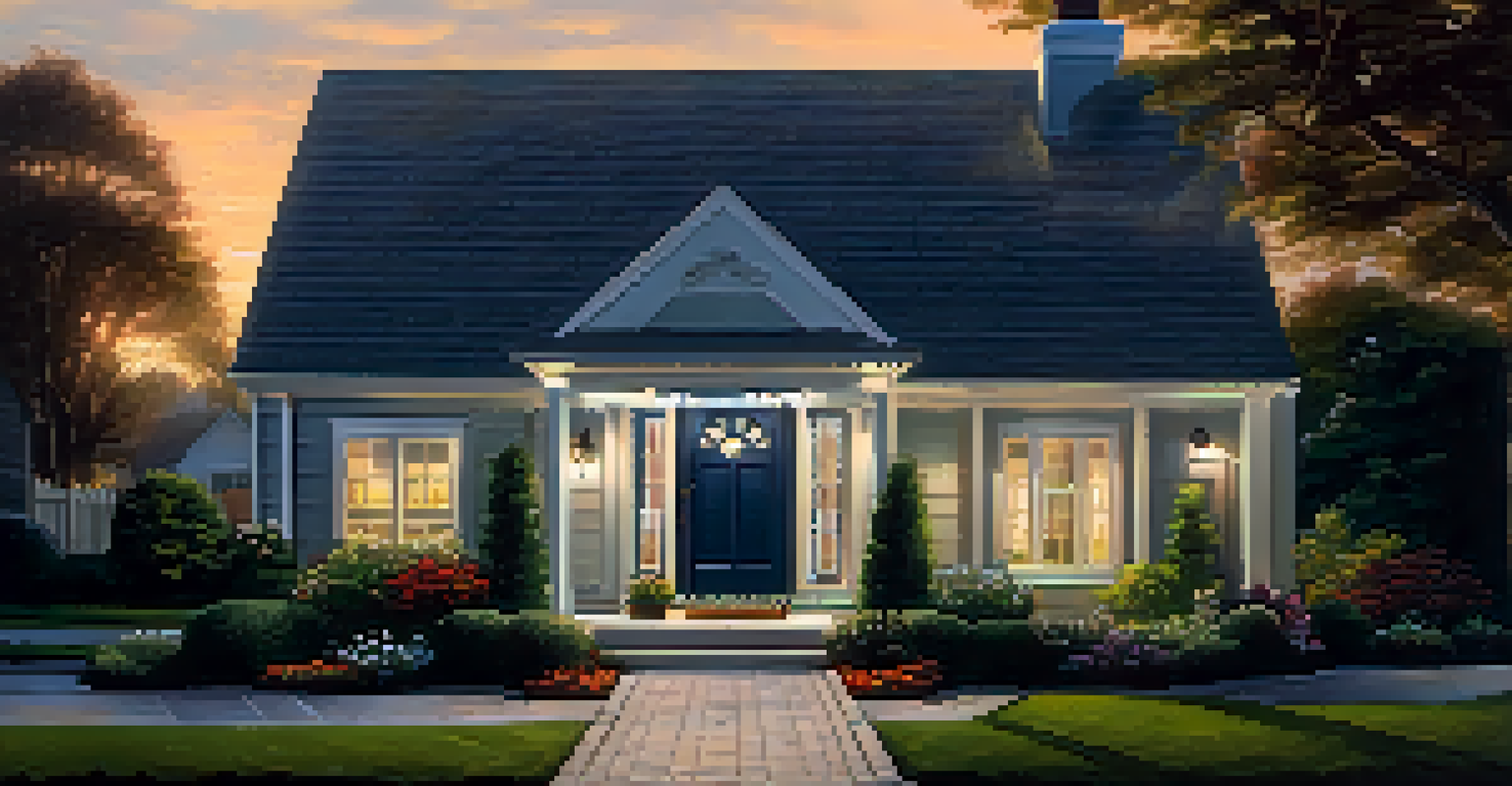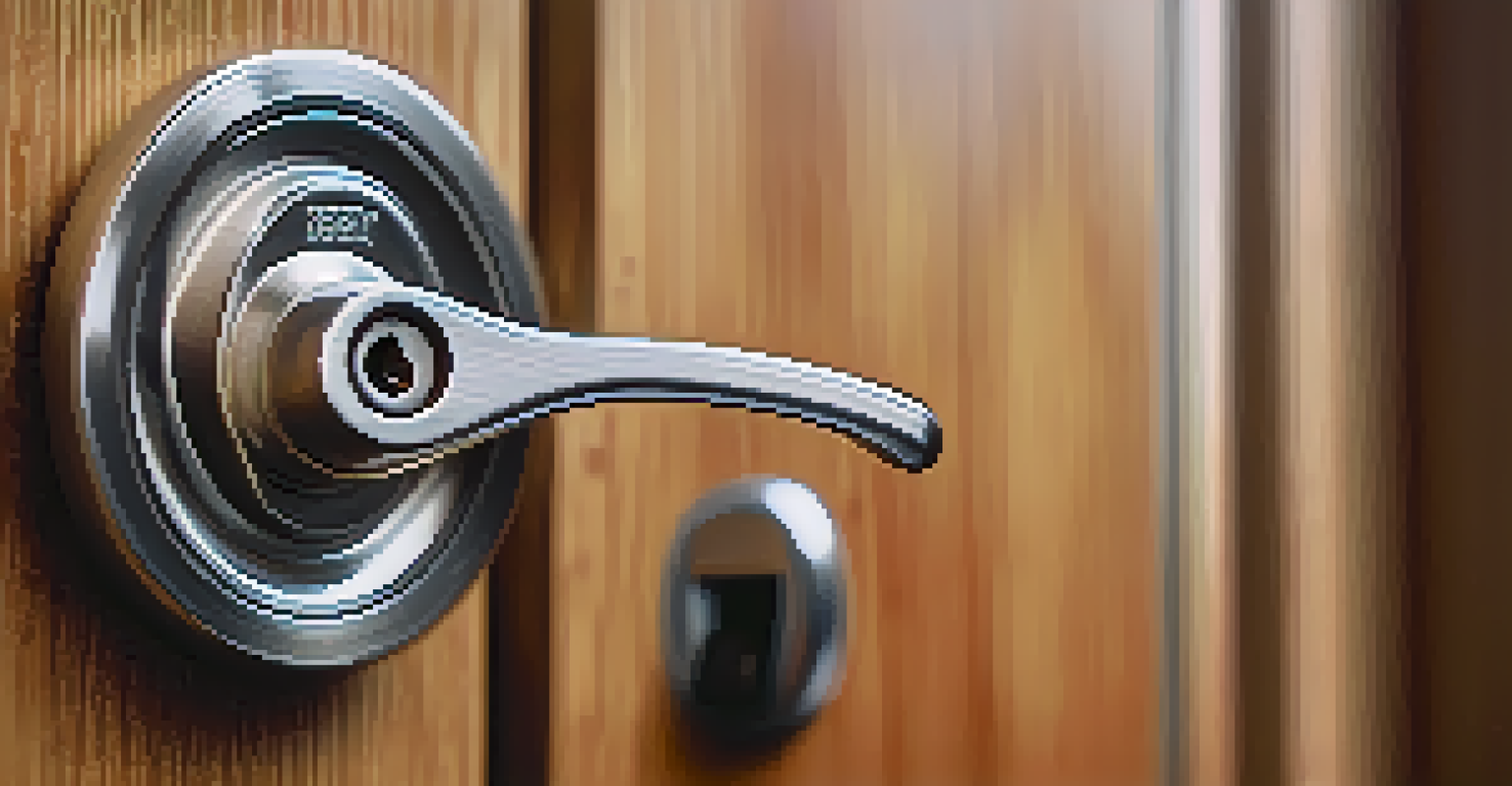Understanding the Role of Home Security Audits

What is a Home Security Audit?
A home security audit is a comprehensive assessment of your property’s safety measures. Think of it like a health check-up but for your home, ensuring that all security systems are functioning optimally. It involves evaluating everything from locks and alarms to outdoor lighting and surveillance cameras. The goal is to identify vulnerabilities that could be exploited by intruders and to enhance your overall security posture.
Security is not a product, but a process.
During this audit, a security professional will inspect your home thoroughly, asking questions about your daily routines and concerns. They will analyze both the physical aspects of your property and the behavioral patterns that could affect security. By understanding both elements, you can develop a tailored security plan that truly meets your needs.
Ultimately, a home security audit empowers you with the knowledge needed to protect your home effectively. It helps you gain peace of mind by ensuring that you are taking the necessary steps to safeguard your family and belongings against potential threats.
Why Are Home Security Audits Important?
Home security audits are vital for several reasons, starting with the identification of weaknesses. Even if you think your home is secure, an audit can reveal overlooked vulnerabilities that could pose risks. For instance, you might have an old lock that needs to be replaced or a motion sensor that’s not functioning properly. These small oversights can significantly compromise your home’s safety.

Additionally, these audits help you stay informed about the latest security technologies and trends. Security solutions evolve rapidly, and what was considered state-of-the-art a few years ago may no longer provide adequate protection. A professional conducting the audit can recommend upgrades and new products that can enhance your security system.
Home Security Audits Enhance Safety
Regular audits identify vulnerabilities and recommend upgrades to improve your home's security.
Lastly, regular audits instill a culture of safety within your household. When everyone is involved in understanding security measures, it fosters awareness and vigilance. This proactive approach not only helps deter potential intruders but also ensures that everyone knows how to respond in case of an emergency.
How to Prepare for a Home Security Audit
Preparing for a home security audit doesn’t have to be daunting; in fact, it can be quite straightforward. Start by making a list of all your current security measures, including locks, alarms, and cameras. This inventory will help the auditor understand what you already have in place and where improvements might be necessary. It’s a bit like gathering all your ingredients before cooking a meal.
An ounce of prevention is worth a pound of cure.
Next, think about any specific concerns or incidents that have made you consider an audit. Perhaps you’ve had a neighbor experience a break-in, or you simply want to enhance your safety. Sharing these details with the auditor will allow them to tailor their assessment to your unique situation, much like customizing a recipe to suit your taste.
Finally, ensure that your home is accessible for the audit. Clear any clutter that might obstruct access to entry points or security devices. This not only makes the auditor's job easier but also gives you a chance to evaluate your own home’s accessibility, which is an important aspect of security.
What to Expect During the Audit Process
During the audit, you can expect a thorough examination of both the interior and exterior of your home. The auditor will check all entry points, including doors and windows, assessing their strength and security features. They may also look at your landscaping, as thick bushes or trees can provide hiding spots for intruders. This comprehensive approach ensures that no area is overlooked.
In addition to physical assessments, the auditor may conduct interviews with you and your family members. They will ask about your daily routines, any security concerns you have, and how you currently use your security systems. This conversation is crucial, as it provides context and allows the auditor to make informed recommendations tailored to your lifestyle.
Prepare for Effective Audits
Creating an inventory of your security measures and addressing specific concerns helps tailor the audit process.
Finally, the auditor will compile their findings into a report, which will include actionable recommendations. This report serves as a roadmap for enhancing your home security, helping you prioritize improvements based on urgency and effectiveness. It’s akin to receiving a personalized action plan that empowers you to take charge of your home’s safety.
Common Vulnerabilities Identified in Audits
Home security audits often uncover common vulnerabilities that many homeowners overlook. One frequent issue is inadequate or outdated locks on doors and windows. Many people don’t realize that even a sturdy door can be compromised with a weak lock. By upgrading to high-security locks, you can significantly increase your home’s defenses.
Another common vulnerability is poor outdoor lighting. Dark areas around your property can serve as hiding spots for intruders, making it important to install motion-activated lights or well-placed outdoor fixtures. Good lighting not only deters criminal activity but also enhances your family’s safety when arriving home at night.
Lastly, many audits reveal the need for better window security. Many homeowners fail to secure windows properly or may not have adequate bars or sensors in place. By addressing these issues, you can create a more secure environment that protects against unauthorized entry.
Implementing Security Recommendations
Once you receive the audit report, the next step is to implement the recommended changes. Start by prioritizing the suggestions based on your budget and the urgency of the vulnerabilities identified. For example, if your locks are outdated, it’s wise to replace them first before tackling other improvements. This approach ensures that your most pressing security issues are addressed promptly.
Consider creating a timeline for implementing the recommendations. This can help you stay organized and motivated as you enhance your home’s security. Breaking the tasks down into manageable steps can make the process feel less overwhelming. Think of it as a DIY project where you tackle one room at a time rather than trying to renovate your entire home at once.
Ongoing Security Maintenance Matters
Implementing audit recommendations and conducting regular reassessments ensures your home remains secure over time.
Finally, don’t forget to revisit your security measures regularly. Security isn’t a one-time task; it requires ongoing attention. Set reminders to reassess your home’s security every year or after significant life changes, such as moving or adding new family members. This proactive approach will ensure that your home remains a safe haven.
The Long-Term Benefits of Regular Audits
Investing in regular home security audits brings numerous long-term benefits. One of the most significant is the peace of mind that comes from knowing your home is secure. When you understand your vulnerabilities and have taken steps to mitigate them, you can rest easier, whether you’re at home or away. This sense of security positively impacts your daily life, allowing you to focus on what truly matters.
Additionally, regular audits can lead to cost savings in the long run. By identifying and addressing vulnerabilities early, you can prevent potential break-ins or damages that may be far more expensive to fix. Think of it like routine maintenance for your car; it’s cheaper to change the oil regularly than to deal with engine failure later.

Finally, consistent security assessments foster a culture of safety within your community. When neighbors see you taking proactive steps to secure your home, they may be inspired to do the same. This collective effort can create a safer environment for everyone, making your neighborhood a less attractive target for criminals.